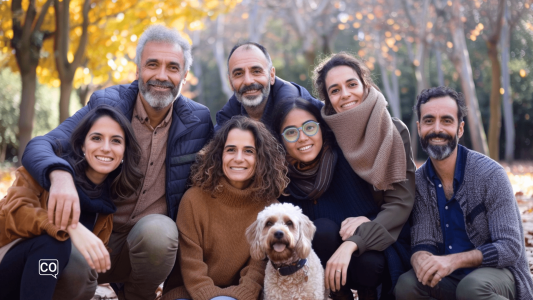Familia

Learning goals:
- Situation: Hablar sobre los miembros de la familia (Talk about family members)
- Situation: Describe a los miembros de tu familia (Describe your family members)
- Verb: Tener (to have) - Presente, indicativo (Present, indicative)
- Grammar: Los adjetivos posesivos (Possessive adjectives)
- Culture: La comida familiar (The family meal)
Learning module 1 (A1): Presentarse (To introduce oneself)
Teaching guidelines +/- 60 minutes
Exercises
These exercises can be done together during conversation lessons or as homework.
Exercise 1: Find the words
Instruction: Find the words, mark them and make sentences with the words.
Show answers Show hintsHints
The sister , The family , The aunt , The brother , The cousin , The mother
Answers
Score: 0/6
| El primo | (The cousin) |
| El hermano | (The brother) |
| La madre | (The mother) |
| La hermana | (The sister) |
| La tía | (The aunt) |
| La familia | (The family) |
Exercise 2: Reorder sentences
Instruction: The words in these sentences have been shuffled! Sort them so that they make a valid sentence again and translate.
Show answers Show translationExercise 3: Translate and use in a sentence
Instruction: Translate and say the word out loud. Use the word in a sentence.
Show translation|
1.
La madre
|
(The mother) |
|
2.
La familia
|
(The family) |
|
3.
El padre
|
(The father) |
|
4.
La abuela
|
(The grandmother) |
|
5.
La hija
|
(The daughter) |
|
6.
El tío
|
(The uncle) |
|
7.
El hermano
|
(The brother) |
|
8.
La tía
|
(The aunt) |
Exercise 4: Translate and make sentences
Instruction: Translate the words and phrases below and use it in a conversation or text.
Show answersExercise 5: Conjugación verbal
Instruction: Choose the correct word, read the sentence out loud and translate.
Show answers Show translationTener (Presente, indicativo)
1. Ellos ... muchas ideas.
2. Él ... dos hermanos.
3. Tú ... un coche nuevo.
4. Vosotros ... un perro.
5. Nosotros ... una casa grande.
6. Yo ... una pregunta.
Exercise 6: Possessive adjectives
Instruction: Choose the correct word, read the sentence out loud and translate.
Show answers Show translationSu, Sus, Mis, tus, vuestro, tu, Nuestros, Nuestras, Mi, Vuestra
1. ¿Cómo se llaman ... hermanos?
2. ¿Cuántos años tiene ... abuela?
3. ¿Dónde vive ... primo?
4. ... familia es muy grande.
5. ... tías es muy graciosas.
6. ... padres tienen un perro.
7. ... tíos viven en Madrid.
8. ... padre vive en Valencia.
9. ... hermana trabaja en Madrid.
10. ... hijos estudian en una escuela nueva.
Exercise 7: Translate and make sentences
Instruction: Translate the words and phrases below and use it in a conversation or text.
Show answers